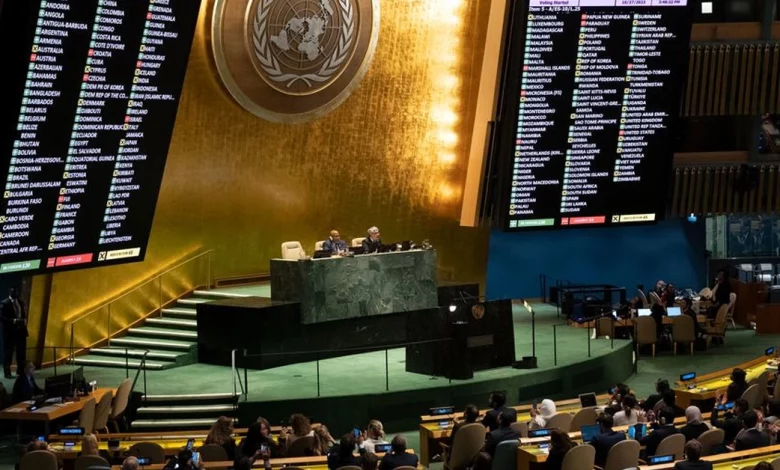Daily Current Affairs for UPSC
UN General Assembly adopts Gaza resolution
Syllabus- International Relations [GS Paper-2]

Context- The UN General Assembly passed a resolution demanding an immediate humanitarian peace between Israel and Hamas and help to enter Gaza.
Key Highlights
- The 193 members of the United Nations General Assembly (UNGA) met again in the 10th extraordinary special session.
- The 10th extraordinary special session is related to the Israeli-Palestinian conflict.
- It was first held in April 1997.
- The 10th extraordinary special session was continued with the current session. They voted on a draft resolution presented by Jordan, which was supported by more than 40 countries.
Broad takeaways from the proceedings at the UNGA
- Resolution
-
-
- Resolution entitled “Protection of Civilians and Respect for Legal and Humanitarian Obligations; was adopted and 120 countries voted for it.
- India joined Australia, Canada, Germany, Japan, Ukraine and the United Kingdom in a group of 45 countries that abstained from voting on the resolution.
- Israel and the United States were among 14 member states that voted against the resolution.
- Try to improve the accountability of Hamas
- An amendment proposed by Canada and supported by the United States sought to correct Hamas’ responsibility for the crisis.
- The amendment specifically condemned Hamas for the October 7 terrorist attack on Israel and called for the immediate release of the group’s hostages.
- India supported the majority (87), 55 member states voted against it and 23 abstained.
- However, this amendment could not be accepted.
-
- The decision is not binding
-
-
- Unlike UN Security Council resolutions, UN General Assembly resolutions are not legally binding.
- It just has incredible weight and moral authority.
- Therefore, despite the massive defeat, Israel and the United States are under no obligation to act on the resolution.
-
- Balanced position of India
-
- India’s balanced position was consistent with the position it maintained in another ongoing conflict in the world: the Russia-Ukraine war.
- Diplomatic accommodation and balance between warring parties has been a consistent feature of New Delhi’s approach.
Highlights of India’s Statement at the UN General Assembly
- The Council condemned the violence, particularly the October 7 attacks by Hamas, and expressed support for Israel.
- India then balanced its support with a statement about the plight of the people of Gaza.
- The Council welcomed the efforts of the international community to reduce and deliver humanitarian aid to the people of Gaza.
- India also contributed to this effort.
- India expressed concern about the security situation and called for restraint and accountability from all parties, including both Israel and its rival Iran, as well as groups such as Hezbollah.
- India reiterated its principled position on the Israeli-Palestinian issue.
- India has always supported a negotiated two-state solution to the Israeli-Palestinian problem.
- India believes in the creation of a sovereign, independent and viable Palestinian state, living within secure and recognized borders and co-existing peacefully with Israel.
- India offered diplomacy and dialogue.
- India called on the parties to scale back, avoid violence and create conditions for a quick resumption of direct peace talks.
United Nations General Assembly (UNGA)
- It was established in 1945 under the Charter of the United Nations and has headquarters in New York.
- It is one of the six main organs of the United Nations and serves as the main decision-making body of the organization.
- It is a unique forum for multilateral discussion on all international issues covered by the UN Charter. All 193 member states of the UN have an equal number of votes.
Special Sessions of the UN General Assembly
- The Charter of the United Nations (Chapter IV, Article 20) provides that the General Assembly should meet in an extraordinary session when the situation requires it.
- Extraordinary sessions are convened by the Secretary-General at the request of the Security Council or by a majority of the members of the United Nations.
- A UN special session is an unscheduled session of the UN General Assembly where urgent recommendations are made on a specific issue.
- If the General Assembly is not in session, the UN Charter allows it to hold an emergency meeting within 24 hours of its request.
- The procedure for convening an urgent emergency session is defined in the regulations of the General Assembly.
- An extraordinary emergency session is convened by the Security Council by a vote of seven member states or by a majority of the members of the United Nations.
- To date, only 11 such extraordinary sessions of the General Assembly have taken place since 1950.
Effect of Decisions of Extraordinary Special Sessions
- These decisions are not legally binding.
- They symbolize the world’s opinion on the crisis and carry political weight because they represent the will of the entire UN membership.
Source: The Hindu





.png)



